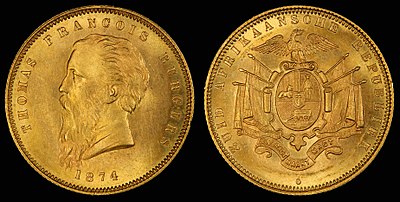Thomas François Burgers
Thomas François Burgers | |
|---|---|
State President of the South African Republic | |
| In office 1 July 1872 – 12 April 1877 | |
| Preceded by | M. W. Pretorius |
| Succeeded by | None (British annexation) |
| Personal details | |
| Born | 15 April 1834 Langefontein, |
| Spouse | Mary Bryson (1836-1929) |
| Alma mater | Utrecht University |
| Occupation | Christian minister |
Thomas François Burgers (15 April 1834 – 9 December 1881) was a South African politician and minister who served as the 4th president of the
Biography
After studying
Burgers quickly became involved in a stormy controversy with the Dutch Reformed synod over his alleged liberalism and disbelief in the literal truth of the Bible. He was critical of traditional culture and strongly emphasised knowledge and rationalism. In 1862, his unorthodox doctrine brought on him an accusation of heresy, and in 1864, he was found guilty by the Synod and suspended. The Supreme Court overturned the decision, and in 1865, he was readmitted to the ministry. Some of his liberal theological ideas and his diverting viewpoints can be found in the sketches he wrote about daily life in Hanover.[1][2]
The burghers of the South African Republic urged Burgers to stand for the presidency, and he was elected by the considerable majority of 2,964 to William Robinson’s 388 in 1872.
The South African Republic's first coins, the
The 1905
By 1877, Burgers was very unpopular and his government was insolvent. Britain, keen on expanding their empire, stepped in and annexed the Transvaal. Burgers retired from political life, settled in the Cape Colony again, and died in 1881, and leaving his family destitute. Coming to the family's aid, Burgers's former private secretary, Th.M. Tromp, published the sketches Burgers had written about his experiences as minister in Hanover. The proceeds of the book, in Dutch and published in the Netherlands, were used to alleviate his family's financial problems.[2] He was a South African Freemason.[6][7] He ended his days disheartened and in poverty. His body was disinterred in 1895, to be reburied in the Pretoria cemetery now known as the Heroes' Acre.[8]
See also
Bibliography
- Burgers, Th.F. (1882). Toneelen uit ons dorp. Den Haag: Henri J. Stemberg.
- Burgers, Th.F. (2008). Wium van Zyl (ed.). Tonele uit ons dorp. Kaapstad: Africana Uitgewers.
- Burgers, Thomas Francois (1979). M S Appelgryn (ed.). Staatspresident 1872-1877. Pretoria en Kaapstad: H.A.U.M.
References
Notes
- ^ Burgers. Toneelen uit ons dorp.
- ^ a b de Jong-Goossens. "Menselijk en overtuigend: de dorpstonelen van Burgers": 78–79.
{{cite journal}}: Cite journal requires|journal=(help) - ^ "South Africa's first gold coin: the Burgers Pond". CoinWeek. 30 October 2012. Archived from the original on 13 May 2021. Retrieved 11 February 2022.
J.J. Pratt
- New International Encyclopedia(1st ed.). New York: Dodd, Mead.
- ^ Bond, J. (1956). "The Makers of Railways". They were South Africans. London: Oxford University Press.
- ^ Kleijn, A. "Voortrekkers, generaals en presidente was vrymesselaars". Bronberger newspaper. Archived from the original on 3 September 2018. Retrieved 14 September 2018.
- OCLC 8520852745.
- ISBN 0-86486-536-8
Literature
- de Jong-Goossens, Riet (April 2008). "Menselijk en overtuigend: de dorpstonelen van Burgers". Maandblad Zuid-Afrika. 85 (4): 78–79.
- Gon, Dr. Philip. “The Last Frontier War.” Military History Journal 5, no. 6. Military History Journal. The South African History Society. (December 1982).
- Grobler, Jackie. “State formation and strife, 1850-1900” In A History of South Africa: From the Distant Past to the Present Day, edited by Fransjohan Pretorius, Pretoria: Protea Book House, 2014.
- Kinsey, H.W., "The Sekukuni Wars." Military History Journal 2, no. 5. The South African Military History Society. (June 1973). http://samilitaryhistory.org/vol025hk.html

